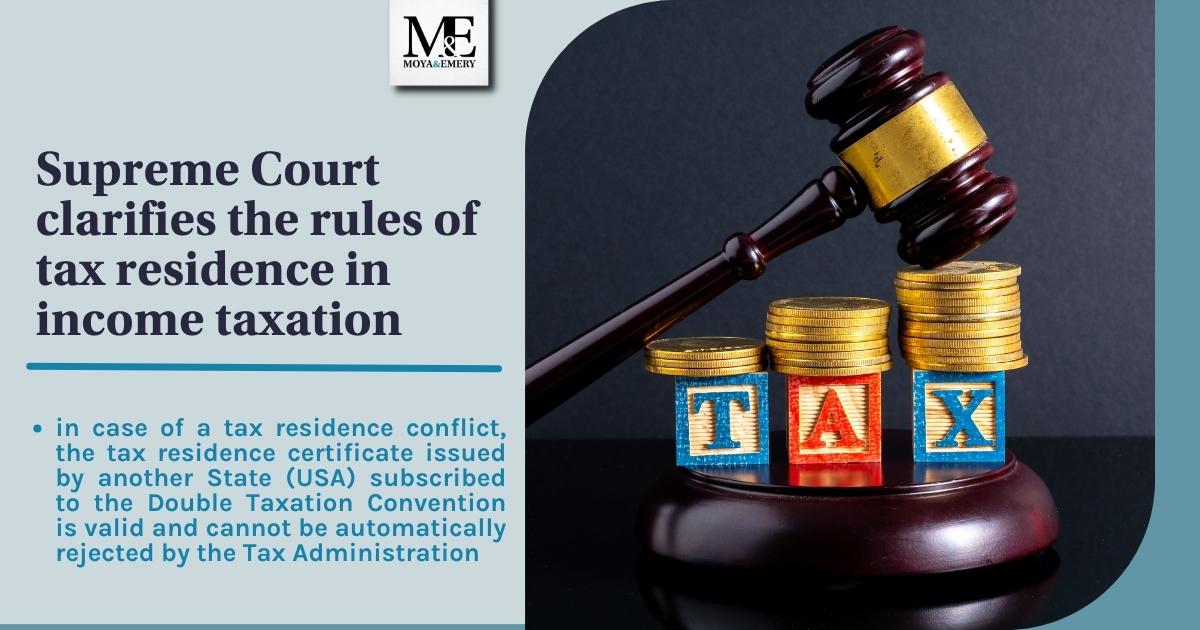Suprema Court clarifies the rules of tax residence in income taxation
The STS 2735/2023 ruling by the Supreme Court sets an important precedent regarding fiscal residency and the application of Double Taxation Agreements (DTA) signed by Spain. Below are the most notable points and their implications:
Validity of the Fiscal Residence Certificate
The ruling clearly establishes that a fiscal residence certificate issued by a State that has signed a DTA with Spain must be accepted by Spanish tax authorities. This means the certificate cannot be automatically rejected.
Primacy of DTA
Upon signing a DTA, a commitment is established to respect the stipulations of the agreement. Thus, any national law or interpretation that contradicts the DTA would be against the law.
Definition of «Resident«
Article 4.1 of the DTA clearly defines who is considered a «resident» for tax purposes, based on criteria such as domicile, residence, management location, among others.
Tie-Breaker Rules
Article 4.2 of the DTA lays out a
set of criteria to be applied in case of conflict over fiscal residency. These criteria will be applied hierarchically until a solution to the conflict is found. If none of the criteria were conclusive, a «friendly procedure» between the involved States would be needed.
Difference between «Center of Vital Interests» and «Nucleus of Economic Interests«
The ruling highlights a clear distinction between these two concepts. While the «center of vital interests» is a broader notion considering both personal and economic relationships, the «nucleus of economic interests» refers exclusively to the taxpayer’s economic interests. This implies that when determining fiscal residency based on the DTA, aspects beyond the merely economic need to be considered.
Implications
- Greater certainty for taxpayers: The ruling provides clearer guidelines and certainty for taxpayers regarding the determination of their fiscal residency in conflict cases.
- Limitation of the Autonomy of the Tax Administration: The Tax Administration cannot automatically reject fiscal residency certificates issued by other States with which Spain has signed a DTA. Moreover, they must rely on the DTA’s criteria rather than national laws when resolving fiscal residency conflicts.
- Standardization of Criteria: By prioritizing DTAs, there’s an aim for uniformity in applying criteria when determining fiscal residency in conflict cases, preventing subjective or discretionary interpretations by the Tax Administration.
In summary…
this Supreme Court ruling reinforces the relevance and application of Double Taxation Agreements and establishes clear limits to the intervention of the Tax Administration in cases of fiscal residency conflicts.
Are you interested in this topic?
Remember that you can read more about important articles and rulings and doctrinal publications on labour, commercial and tax matters in our blog.
Do you have doubts about your tax residence? At Moya&Emery we can help you.
We have a multidisciplinary team of professionals who can offer you advice on the tax implications that in your specific case may arise from both the acquisition and the loss of Spanish tax residence. Do not hesitate and contact Moya&Emery.
Or fill in our form and we will contact you.

